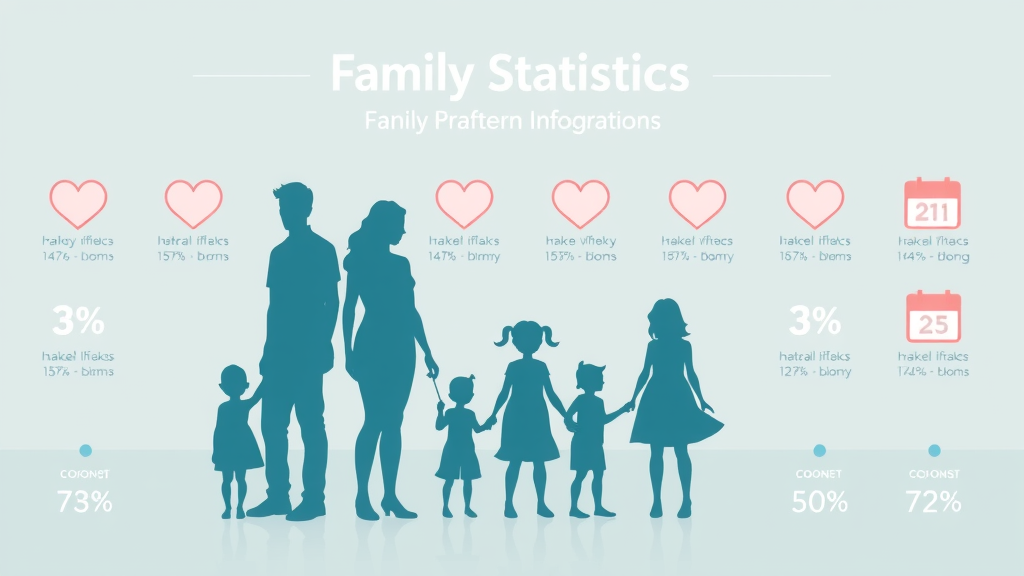Did you know? Teens with access to strong co-parenting strategies are 40% less likely to develop behavioral issues, according to recent studies. If you’re a divorced parent navigating the complex teenage years, your approach can mean the difference between turbulence and resilience. This guide provides the essential tools to empower your parenting journey, keep your teen’s well-being front and center, and help your family thrive.
Co-Parenting Strategies: What You’ll Learn in This Guide
- The importance of co-parenting strategies during adolescent development
- How divorced parents can create an effective parenting plan
- Tips for fostering positive relationships while addressing mental health needs
- Practical communication techniques and parallel parenting models
- Resources for professional support when co-parenting teens
Setting the Scene: Critical Stats and Facts About Co-Parenting Strategies for Divorced Parents
Adolescence is a period marked by rapid change, self-discovery, and heightened sensitivity to family dynamics. For divorced parents, co-parenting strategies are not just about logistics—they are about creating a sense of stability during these transformative years. Recent surveys reveal that over 50% of teenagers from separated households report improved emotional adjustment when parents use open communication and consistent parenting plans. Furthermore, access to supportive co-parenting can increase teens’ school engagement, lower their risk of depression, and support healthy relationships with both parents. Crafting thoughtful co-parenting arrangements is crucial for maintaining a supportive environment, leading to fewer feelings of divided loyalty and more positive relationships as your teen matures.

“Teens with access to strong co-parenting strategies are 40% less likely to develop behavioral issues, according to the Journal of Adolescent Health.”
Understanding Co-Parenting Strategies: Core Principles Every Parent Should Know
- Definition of co-parenting strategies for divorced parents
- Importance and lifelong impact on adolescents
- Balancing different parenting styles for best results
Co-parenting strategies refer to the collaboration and shared decision-making processes adopted by divorced parents to raise their children effectively. For teens, who crave independence but still need parental guidance, consistent strategies help them feel secure and understood. This approach is rooted in respect, flexibility, and a united front—even when parents’ styles differ. Research shows that when divorced parents communicate and cooperate across separate households, their children are more likely to enjoy long-term emotional stability and academic success.

The lifelong impact of effective co-parenting cannot be overstated: it affects your child’s resilience, sense of belonging, and ability to form positive relationships. By embracing open communication and balancing varied parenting styles, you’re building a framework that supports your teen as they navigate life’s most challenging transitions.
Developing a Robust Parenting Plan: Co-Parenting Strategies that Work
Why a Parenting Plan Is Vital for Divorced Parents
- Structuring time-sharing and responsibilities
- Tips for involving teens in the parenting plan
A well-structured parenting plan is the blueprint for successful co-parenting strategies. It allows divorced parents to set clear expectations around parenting time, holidays, curfews, and who handles important issues like mental health appointments. Involving your teen in creating the plan can foster ownership and improve buy-in, ensuring the arrangements reflect their needs and preferences for equal time and stability. By letting teens express their point of view, you can reduce conflict and misunderstandings down the road.
| Strategy | Custody Type | Communication Level | Best For |
|---|---|---|---|
| Joint Custody | Both parents share legal and physical custody | High—frequent calls/text messages and decision-making together | Cooperative divorced parents, teens needing a strong sense of stability |
| Parallel Parenting | Both parents remain involved but limit direct contact | Structured—only essential info exchanged, usually in writing | High-conflict situations, teens who benefit from reduced parental tension |

Identifying Your Parenting Style and Its Role in Effective Co-Parenting Strategies
- Recognizing authoritative, permissive, and uninvolved parenting styles
- Adapting your parenting style for teens
Knowing your parenting style—whether authoritative, permissive, or uninvolved—plays a pivotal role in how co-parenting strategies unfold. Authoritative parents set clear rules and are receptive to their teen’s input, balancing firmness with warmth. In contrast, permissive parents are nurturing but set fewer boundaries, while uninvolved parents may lack consistent presence. The most effective co-parenting occurs when both parents acknowledge their styles and adapt them to meet their teen’s evolving needs. For example, divorced parents who recognize their differing approaches can work to present a united front, ensuring their child receives consistent messages and support.
Adaptability is key: as your teen matures, their desire for more autonomy should be met with opportunities for self-direction within agreed limits. Discuss your individual parenting styles openly and look for ways to blend your strengths. By setting common ground, you foster an environment where your teen can flourish, even while navigating between separate households.
Effective Communication: The Keystone of Co-Parenting Strategies

- Channels for successful communication between divorced parents
- Digital tools and shared calendars for co-parenting
Effective communication is crucial for maintaining a positive relationship between divorced parents and ensuring your co-parenting strategies work. Whether it’s a phone call, text message, or shared co-parenting app, having set communication channels helps avoid misunderstandings and keeps everyone informed about your teen’s needs. Many parents utilize shared digital calendars, allowing both parties to update schedules in real time and eliminate the guesswork from arranging appointments, activities, or special events.
“Effective communication isn’t about agreement—it’s about clarity and consistency.”
Remember, the goal isn’t total agreement but creating a supportive environment where information flows easily and your teen’s interests remain the priority. Establish communication ‘rules’—such as responding to messages within a set time or avoiding sensitive discussions in front of your child—to reduce conflict. Over time, these small strategies build trust and model healthier ways to solve conflicts for your adolescent.
Parallel Parenting: When Co-Parenting Strategies Need Boundaries
- What is parallel parenting and how is it different?
- When to use parallel parenting strategies
- Reducing conflict through structured approaches

For some divorced parents, communication becomes so challenging that a parallel parenting approach—where parents disengage from each other except for necessary updates—proves most effective. Unlike joint co-parenting, parallel parenting relies on highly structured routines and written communication. This model is ideal when high conflict might otherwise disrupt your teen’s sense of stability.
Professionals recommend parallel parenting in situations where direct contact fuels arguments, or where cooperation is not possible due to different parenting styles. Instead, each parent manages day-to-day activities independently, helping your child feel less caught in the middle. Parallel parenting still requires both parents to put your children first by prioritizing consistency and shielding them from disputes, which research shows improves mental health outcomes and promotes better adjustment.
Prioritizing Teen Mental Health in Co-Parenting Strategies
- Recognizing mental health warning signs in teens
- Integrating support for your child’s well-being into your co-parenting strategies
Supporting a teen’s mental health is at the heart of successful co-parenting strategies. Adolescents are vulnerable to anxiety, depression, and stress, which can be magnified by divorce or unsettled home dynamics. Watch for warning signs such as withdrawing from activities, changes in sleep patterns, irritability, or sudden drops in grades. Early recognition enables you to address small issues before they become major concerns—especially when both parents collaborate.

“Put your children first by addressing their mental health needs; it’s at the heart of successful co-parenting strategies.”
Incorporating support for your teen’s well-being can range from regular mental health check-ins to involving a family therapist if your child is struggling. Create a supportive environment where your teen feels safe sharing their thoughts with either parent, and emphasize that seeking help is a sign of strength. Consistently checking in can reinforce trust and help your teen feel secure—even amidst life’s inevitable changes.
Fostering Positive Relationships: Healthy Co-Parenting Strategies for Teens
- Encouraging teens to form healthy relationships with both parents
- Mitigating loyalty conflicts and parental alienation
One of the primary co-parenting strategies is encouraging your teen to build positive relationships with both parents. Teens often feel pressure to choose sides, especially if communication is tense. By openly supporting your teen’s relationship with your co-parent, you reduce loyalty conflicts and parental alienation—giving your child space to connect naturally.

Make it clear—even in simple ways, like showing up together at your teen’s performances or school meetings—that you are a united front when it comes to their well-being. Reinforce to your teen that their relationship with both parents is valued. This approach helps your teen develop deeper trust, a healthy self-image, and tools for managing their own relationships as adults.
The Role of Professional Support in Effective Co-Parenting Strategies
- When to seek family counseling or mediation
- How professional support strengthens co-parenting arrangements
There are times when outside guidance is needed—don’t hesitate to access professional support. Family counselors and mediators help divorced parents resolve disputes, improve effective communication, and develop healthier co-parenting strategies. These professionals bring a neutral point of view and can offer insight that leads to breakthroughs, especially when parents are stuck in old patterns.
Seeking professional support is not a sign of failure—it’s a proactive step towards a healthier future for your teen. Family therapists can facilitate sessions for both parents and teens, address behavioral problems collaboratively, and help establish boundaries if parallel parenting is necessary. This investment in professional support strengthens co-parenting arrangements and provides teens with additional resources to thrive.
Coping With Challenges: Co-Parenting Strategies for Special Situations
- Managing schedule changes and life transitions
- Addressing behavioral problems collaboratively

Parenting teens is rarely straightforward—schedules will shift, conflicts will arise, and unexpected events can disrupt even the best-laid plans. Flexibility, preparation, and joint problem-solving are crucial for maintaining healthy co-parenting strategies during challenging times. For example, if a sudden school event or health issue arises, work together to adjust your parenting plan, maintaining open communication and keeping your teen’s needs as the primary focus.
When facing behavioral issues, approach the situation as a team rather than placing blame. Share insights with each other (and with professionals, when needed) to identify solutions, and present a consistent response in front of your child. This approach ensures your teen continues to feel held and supported, even when times are tough.
Customizing Co-Parenting Strategies: Tailoring Your Approach for Every Teen
- Considering individual teen personalities and needs
- Flexibility in parenting plans and communication
No two teenagers are the same—and co-parenting strategies should reflect this. Some teens may need additional support due to learning differences, social anxiety, peer pressures, or unique talents that require special scheduling. Adjust your parenting plan to honor your child’s personality and interests, whether it means flexibility for sports travel, extended visits for school projects, or customized rules around screen time and friends.
By remaining flexible and responsive, you can ensure your teen benefits from the structure of effective co-parenting while also feeling heard as an individual. Encourage your teen to share feedback, and regularly review your arrangements as their needs and circumstances change. This adaptability sets your parenting up for long-term success and helps your teen evolve into a confident, well-adjusted adult.
Lists of Must-Do Co-Parenting Strategies for Divorced Parents
- Establish clear boundaries and expectations
- Use a shared parenting calendar
- Prioritize your teen’s needs in all decision-making
- Attend important teen events together whenever possible
- Regularly review and adjust your co-parenting plan
Video Resource: Interview with a Family Therapist on Co-Parenting Strategies
In this insightful video, a respected family therapist shares actionable co-parenting strategies, from everyday routines to navigating complex family dynamics, with real-world examples for divorced parents raising teenagers.
Learn practical steps for maintaining clear boundaries and open lines of communication, even in high-conflict or parallel parenting situations. This resource is especially useful for establishing a sense of stability and positive relationships across separate households.
People Also Ask: Co-Parenting Strategies for Teens
What is the 7 7 7 rule parenting?
This rule refers to dividing responsibilities across every seven hours, days, or weeks, depending on the arrangement. In co-parenting strategies, especially for divorced parents, this rule can help structure time and offer consistency for teens.
What is the best way to co-parent?
The best co-parenting strategies emphasize effective communication, shared responsibilities, mental health awareness, and consistently putting your children first.
What is the 30% rule in parenting?
The 30% rule suggests that even if a child spends 30% of their time with one parent, the relationship can remain strong and impactful—making time quality more important than quantity in co-parenting strategies.
What are the three types of co-parenting?
Three types include cooperative co-parenting, parallel parenting, and conflicted co-parenting. Each type requires different co-parenting strategies and communication styles.
Frequently Asked Questions on Co-Parenting Strategies
-
How often should co-parenting agreements be reviewed?
Parenting plans should be revisited at least annually or whenever your teen experiences a significant life change (such as entering high school, changing sports, or a major move). -
How do co-parenting strategies adapt as teens mature?
As teens grow, involve them more in decision-making and grant increasing independence within safe boundaries, updating the co-parenting plan to reflect their maturity level and preferences. -
What resources are available for ongoing professional support?
Family therapists, school counselors, co-parenting workshops, and online communities provide valuable support for adapting strategies and handling new challenges as they arise.
Key Takeaways: Practical Co-Parenting Strategies for Divorced Parents
- Consistency, communication, and compassion are critical
- Tailor co-parenting strategies to fit your teen’s needs
- Seek professional support and prioritize your child’s mental health
Inspire Better Co-Parenting Strategies: Download Our Free Co-Parenting Plan Template
Take your co-parenting strategies to the next level. Download our free co-parenting plan template and start building a collaborative, supportive environment for your teen today.
 Add Row
Add Row  Add
Add 





Write A Comment